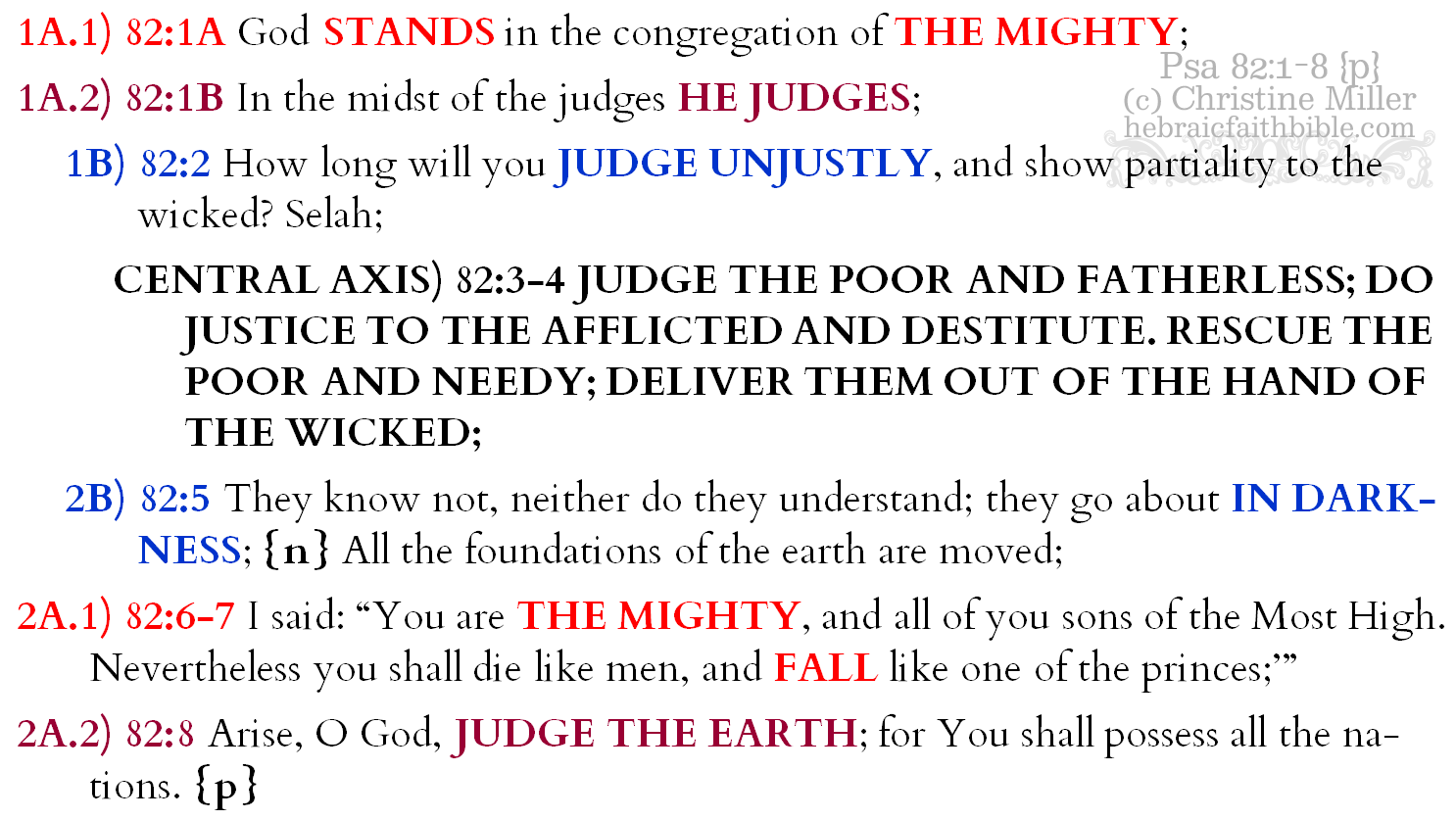Sons of God in Genesis 5:32-6:4
Read Psa 82:1-8 at Bible Gateway.
We need to refer to the Psa 82:1-8 chiastic structure:
The JPS translates this psalm:
1 A Psalm of Asaph. {n}
God standeth in the congregation of God; in the midst of the judges He judgeth:
2 ‘How long will ye judge unjustly, and respect the persons of the wicked? Selah
3 Judge the poor and fatherless; do justice to the afflicted and destitute.
4 Rescue the poor and needy; deliver them out of the hand of the wicked.
5 They know not, neither do they understand; they go about in darkness; {n}
all the foundations of the earth are moved.
6 I said: Ye are godlike beings, and all of you sons of the Most High.
7 Nevertheless ye shall die like men, and fall like one of the princes.’
8 Arise, O God, judge the earth; for Thou shalt possess all the nations. {p}
How do I know that in verse 1, God stands in the congregation of the mighty instead of in the congregation of God as the JPS has it? Because Strong’s H430, elohiym, can be translated and is translated both as “God,” the one true God, and “judges, rulers, the mighty” in Scripture, depending on context.
Then the chiastic structure reveals its meaning. It is one reason chiasms are a teaching tool of Scripture, which God has embedded in His Word so that He will be understood. The matching pair for Psa 82:1a, “standing in the midst of the mighty,” is found in 82:6-7. In 82:6-7 even the JPS translates elohiym as “godlike beings,” that is, as something other than the one true God, as the context clearly demands. Notice also that in the 1A.1 pair, God stands, as contrasted to the mighty in the 2A.1 pair, who fall.
This psalm contains more clues that it is related to the common theme of “sons of God,” that is, “sons of rulers, sons of judges” introduced in Gen 5:32-6:4 {p}.
“Falling” like one of the princes, in 82:7, is the Hebrew verb Strong’s H5307 naphal, the exact same root of nephilim, “the fallen,” found in Gen 6:4. In this context it is clear that the fallen who are meant are men and not angels; princes of men, however, and not common men.
And the overarching theme of Psa 82 is an admonition, censure, and correction of judges who are judging unjustly; the same condition which existed in Gen 5:32-6:4, if elohiym there is to be translated “rulers” or “judges” as it is here.
Now here is something interesting. “Sons of the Most High” found in 82:6 is just another way of saying “sons of God,” found in Gen 5:32-6:4. In this context it is clear that the Most High is referring to God and not rulers. But this clue gives us another puzzle piece to unlock the meaning of Gen 5:32-6:4.
While it is clear that in Psa 82:6 “Most High” is referring to God and not to men, judges, or rulers, the phrase “sons of the Most High” clearly is referring to men, judges, and rulers. Psa 82:7 assigns the mortality of men to them, referring to them as well as fallen princes – that is, fallen men who happen to rule, as we have seen.
If here in Psa 82, “sons of the Most High” refers to men who are rulers and princes, is it possible that in Gen 5:32-6:4, “sons of God,” likewise refers to men who are rulers and princes? I believe so.
Next:
Translating Strong’s H430, Elohiym
Sons of God in Job
Bunny trail: the chief cornerstone
Sons of God and morning stars
Spiritual and natural rulers
Goat demons, then and now
The origin of the goat demon in antiquity


















Leave a Reply